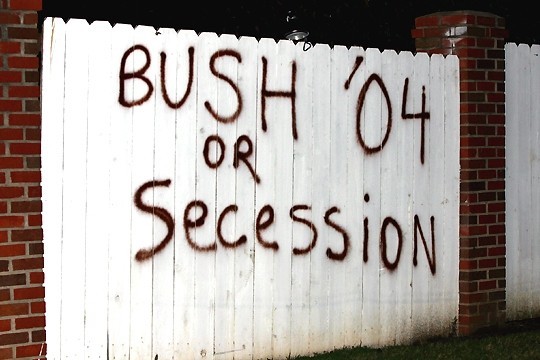
Students react to four more years of President Bush
The 2000 Presidential Election had chads — hanging,dangling and swinging; the 2004 election has provisionalballots.
2000 had Miami and the 27 electoral votes of Florida; 2004 hasCincinnati, Cleveland and Ohio’s 20 votes.
Many across the nation predicted this year’s PresidentialElection to echo the Bush-Gore battle of four years ago, andTuesday night did not disappoint.
Election day turned into hump day and media outlets struggled to”call the race” — an aspiration that becameprogressively more difficult as supporters outside the studiosexchanged shouts of “Four more years!” and “Onemore day!”
As votes were counted and battlefield states fell on either sideof the political scale, the importance of Ohio voters’opinions became increasingly apparent.
The state’s 88 counties were seemingly split on a newpresident well into Wednesday morning, though the Democratic ticketprepared for the worst.
In a statement early yesterday morning, vice presidentialcandidate John Edwards remarked from Boston, “John Kerry andI have made a promise to the American people that with thiselection every vote would count and every vote would becounted.
“Tonight,” the North Carolina senator continued,”we are keeping our word and we will fight for everyvote.”
It was not until mid-morning press releases revealed George W.Bush — the current president — as America’s nextleader.
And while this year’s election was decidedly over within aday of the initial votes, the isolation of a single state as thedeciding point for the next Commander in Chief caused many tofurther magnify the comparison of Tuesday night’s events toFlorida in 2000.
Julie Sikes, a senior marketing major and native of “theSunshine State”, was on hand to recall first-hand theconfusion of four years ago. “I was expecting Florida to be abig problem this year,” she said, “but I’m gladit wasn’t.”
While an MSNBC figure revealed a voter turnout of 59.1 percent,the highest in over 30 years, a low number of college-age voters[17 percent, unchanged from the 2000 election] showed up atTuesday’s polls.
Regardless of the miniscule amount of young voters, SMU studentsreacted Wednesday as Sen. John Kerry made his concession speech,formally ending the presidential race of 2004.
“At first, I thought it was going to take another month toresolve,” senior Spanish and international studies doublemajor Lauren Chapman said of this year’s election. “Iwas happy to see [the candidates] didn’t drag it out for along time.”
Chapman, for one, was wary of the endless overnight coveragecentering on the state of Ohio.
“I originally thought the media made Ohio out to be abigger deal than it was,” she remarked, “but then Iheard the Kerry campaign was contesting it.”
Ghazzaleh Rezazadeh, a junior political science major, has notbeen pleased with the recent division among American voters.”There’s trouble in the political system when there isnot a strong majority of votes for either candidate,” shesaid, “because we now have so many citizens who don’tsupport the president.
“We need to go back to the old days,” Rezazadehcontinued, “when the president got at least 60 percent of thepopular vote.”
While neither candidate may have received much more than half ofthe voters’ support, a divided nation has not amounted tosilenced students; no matter the turn out at the polls Tuesday,most at SMU appeared to maintain their own opinion one way or theother.








